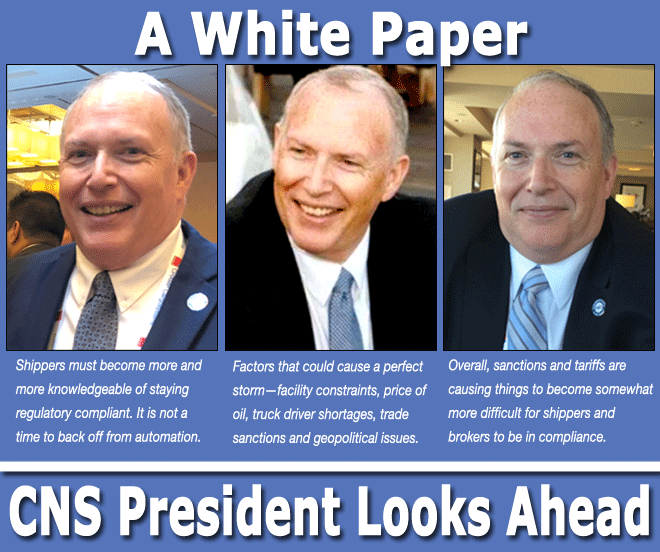 |
In a year of uncertainty marred by huge
unrest in everybody’s favorite gateway, Hong Kong, we asked Mike
White, President of USA-based Cargo Network Services (CNS) to share some
thoughts that might also act as a beacon for many of us in transportation
trussed up in tariffs and an otherwise tough (to the point of being even
a nasty awakening) business year.
So, pour a coffee if you are at work, or
an adult beverage if it is after hours, pull up a chair, take this in,
and then maybe call up a colleague and have the story read (if they have
not seen it) so you can both help widen the school of thought, as 2019
slogs along.
We like that the world has an organization
like CNS that has named someone who has his finger on the transportation
pulse, and his heart and soul into lifting air cargo and helping everybody.
Dare we say it again:
We like Mike.
Since we know Mike as one of the smartest
guys, who not only knows something, but he also is always listening, we
share his thoughts with you right now.
FT: What
impact has Hong Kong unrest having on cargo to and from China & Intra
Asia Pacific?
MW: The unrest
in HKG has caused of course some very limited issues for the short term.
What hasn’t been discussed as much is the growth of other carriers
from the region which are expanding service from the manufacturing areas
within China.
For instance SF Airlines from Hangzhou (HGH)
and New York (JFK) and Uni-Top Airlines from Wuhan (WUH) to Chicago (ORD)
with freighters are new routes not seen. We are also seeing new additional
service from China with recent articles talking about how United will
enter the San Francisco (SFO) to Guangzhou (CAN) sector, as well as new
additional service to HKG. There is a lot of capacity growth in the China
market.
FT: Also,
what do you think will be the impact for the traditional Christmas rush?
MW: The recent
backing off by President Trump on tariffs from China until the end of
the year will cause most likely a short-term demand for electronics and
smaller priced goods for the Christmas rush. The concern is, will there
be a drop-off after Christmas, if the tariffs do kick in? This may cause
a stocking of goods early, to beat the tariffs.
FT: What
other impacts?
MW: The discussion
by U.S. government officials is the impact of raising the de minimis value
of goods for U.S. customs clearance to $800. This has somewhat opened
issues on how cargo is shipped into the U.S. A lot of these types of cargo
that are under the $800 value. This means a lot more shipments being sent
in smaller or single quantities. CBP has reported a 30% increase in the
number of house waybill shipments. Many of these shipments are being sent
via the postal systems, especially those being shipped from China Post
to USPS. CBP has also increased crackdown on electronic data for the shipments
and a higher increase of screening to reduce illicit and counterfeit shipments.
The other issue is the global impact is
Europe. With the recent political issues in Italy and the upcoming EU
budget deadline may have further impact on the balance of Europe. There
of course is the concern over what issues BREXIT may bring on.
Overall, sanctions and tariffs are causing
things to become somewhat more difficult for shippers and brokers to be
in compliance.
FT: Near
and long term? What should shippers do?
MW: Shippers must
become more and more knowledgeable of staying regulatory compliant. It
is not a time to back off from automation. Paperless export in the CBP
Automated Commercial Environment (ACE) is in pilot stage with all transport
carriers. It is expected that ACE Export will be coming sooner than we
think, and forwarders, shippers and carriers must not slow down on moving
to a paperless environment.
FT: Any
other thoughts about this year, tariffs? Do you expect an easing of tariffs?
Our take is that Trump has loosened up a bit as markets took a big hit
last week.
MW: As we all know,
the Trump administration can change in a minute. The President has backed
down some and it something to watch as to how the Administration deals
with, not just China, but other areas as well.
High-value goods that travel by air were to be
the last of the tariff-covered imports, but it now appears that they are
to be part of the mix. If the White House reduces the de minimis values,
this could have more impact on air cargo than the tariffs themselves.
FT: Stocks
are at times flat in summer but 800 points in one day recently was an
eye opener about possible recession.
MW: In the CNS
Summer 2018 Air Cargo Focus I wrote about the factors of an upcoming “Perfect
Storm”. It is a concern that the storm is coming and here is what
I said. There are several factors that must be watched that could
cause this perfect storm. These include airport facility constraints,
price of oil, truck driver shortages, trade sanctions and geopolitical
issues. We have seen most of these issues already taking place. Question
will be, how does air cargo take these into consideration when planning
their network and fleets?
For CNS we are focusing on airport constraints
and have begun initial steps on looking at JFK. We are seeing some ideas
already being developed and have had good discussions with the Port Authority
on their development of new air cargo facilities.
We have also begun discussions with airlines,
forwarders and ground handlers to get their views of those in the know.
Can we find some best practices, improved communication or other areas
that we can identify to improve upon? We
plan on learning more, and sharing that with members of our CNS Advisory
Board and discussing what we as an industry can do to improve our industry.
Geoffrey
|




 Vol.
18. No. 51
Vol.
18. No. 51